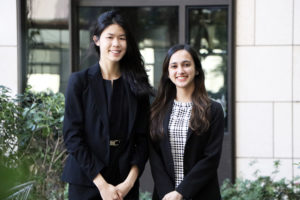Victory in Court: Clinic Students Win Case at the Intersection of Criminal and Immigration Law

Our client T is a lawful permanent resident who has lived in the United States as a green card holder for over 30 years. Over a decade ago, T had a few encounters with law enforcement and ended up in criminal court. He entered into a plea agreement that allowed for an automatic “disappearance” of the offenses if he complied with the terms of the plea. At the time of his plea, he was not advised that such a “disappearance” would not actually apply to immigration consequences. As you can imagine, he was completely surprised when 10 years after his last encounter with the police, he returned from a family vacation abroad and was detained by immigration agents. T was then thrown into removal proceedings based on decade-old minor drug offenses which he had believed would not impact his immigration status.
Upon realizing that T was not properly advised at the time of his plea, we engaged with the Santa Clara County Public Defender’s office to explore the possibility of Post Conviction Relief (“PCR”). PCR allows for a revisiting of past pleas where there were legal and constitutional errors made at the time of the plea. We put together a detailed packet that included corroborative evidence regarding the misinformation he received along with details about the equities in his case, including the fact that he had lived a law abiding and sober life for over a decade and that he was the pillar of his family.
After reviewing the evidentiary packet, the District Attorney agreed to enter into a joint stipulation to vacate T’s previous convictions. Despite COVID-19 restrictions on court access, the state court agreed to an ex parte hearing. In late April, the state court judge agreed to the stipulated withdrawal of the plea and granted our Motion to Vacate.
Armed with the vacatur from state court, we then prepared a Motion to Terminate the immigration proceedings. The motion was based on legal arguments relating to the fact that T was no longer deportable, as the predicate convictions (which served as the initial basis for alleged removability) had been vacated on constitutional grounds. In essence, we explained that T’s vacatur in state court nullified all immigration consequences. We engaged with opposing counsel over email and responded to some of the attorney’s initial questions and concerns. Ultimately, DHS filed a statement indicating that they would not be opposing our request to terminate proceedings. Almost immediately thereafter, the immigration judge granted our Motion to Terminate, officially ending T’s three year saga in immigration proceedings.
When T heard of the good news, he immediately burst into tears. The end to the removal proceedings means that T can finally have his life back again. T said that he felt like he was “reborn again,” and that life had given him another chance. And with this new chance, T is determined to continue being the wonderful father, husband, friend, neighbor, and community member that he is.
One of our primary takeaways from working with T has been the value of client-centered lawyering and the positive impact it has on the client. Every step of the way, we explained complex legal concepts to T who closely followed along as his case progressed. Our emphasis on client-centered lawyering helped balance the power differential and accorded T the respect he deserved. Working with T also taught us how to employ creative legal strategies. When T’s immigration case seemed to hit a dead end, we decided to change tactics and focused on eliminating his prior convictions in criminal court, while simultaneously fighting his case in immigration court.
Of course, all of this would not be possible without the help of our supervisors (Jayashri Srikantiah, Lisa Weissman-Ward, and Shanti Tharayil for their consistent feedback and encouragement) and the Santa Clara Public Defenders office (Beth Chance who guided us throughout this process).
Mishi Jain, JD ’21, and Trillium Chang, JD ’21, represented their client, T, as student attorneys in the Immigrants’ Rights Clinic in the Winter 2020 quarter. Students worked throughout the quarter to represent their client in San Francisco Immigration Court. Students also engaged with the Santa Clara County Public Defender’s office to vacate their client’s criminal convictions. Their hard work led to a victorious outcome for their client, who can now remain in the U.S. without fear of deportation.
